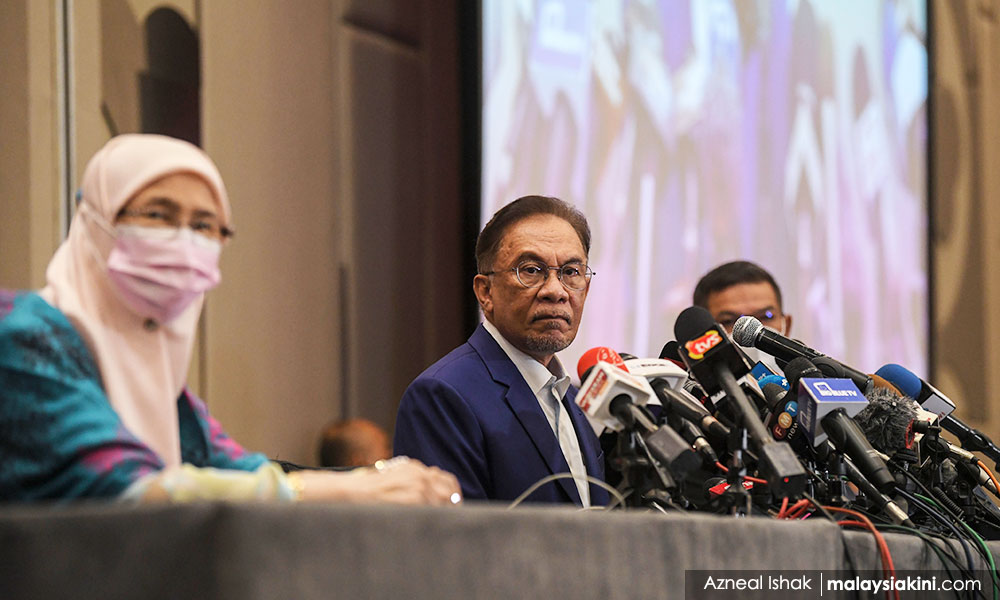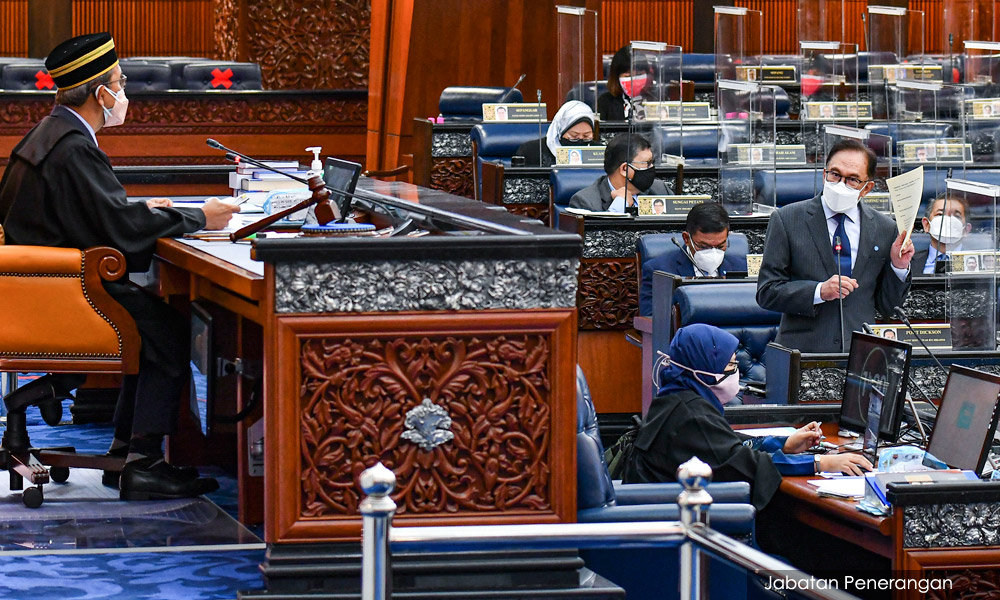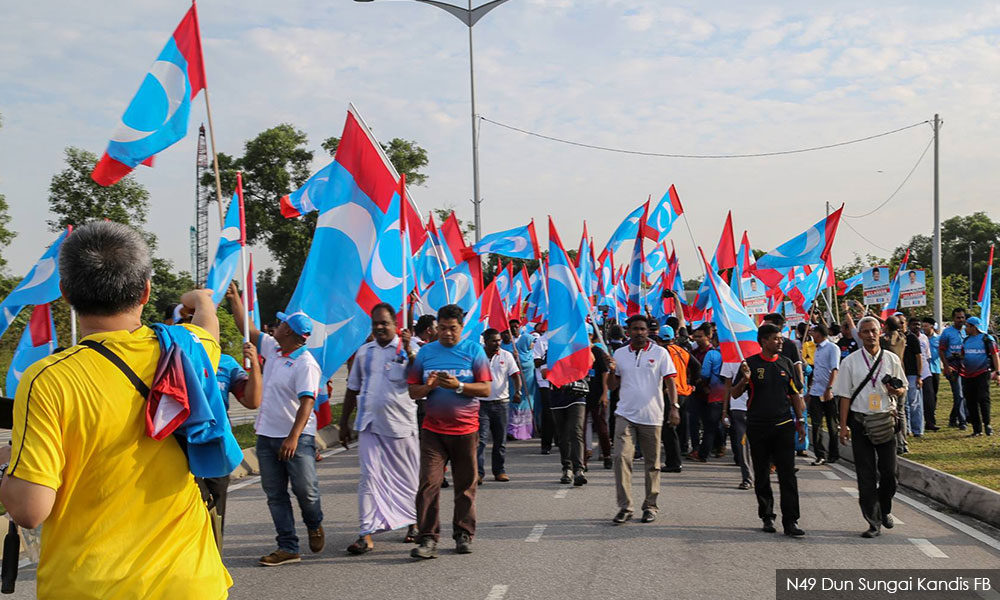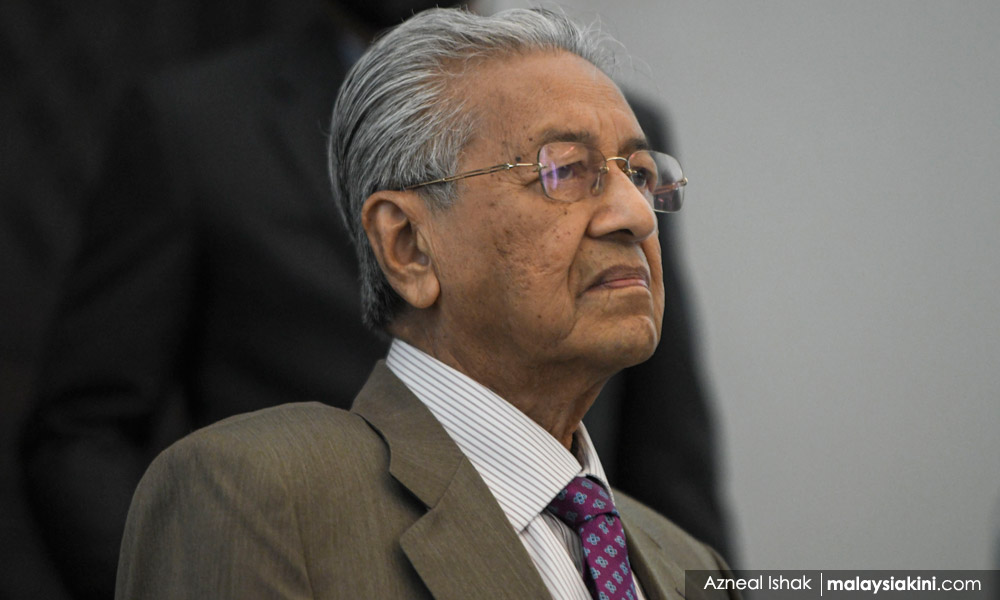Once an iconic figure among the nation’s youth, PKR president Anwar Ibrahim is now facing ever-increasing calls for him to bow out since November 2021, following the party’s dismal performance in the Malacca state election.
It became even clearer, in the state election that followed, that the party - which won a singular seat in Johor - had found itself entrenched in its wilderness years.
While he is widely seen by his party followers and many general observers as a victim of political persecution, the fear is that he is no longer the compelling orator he once was.
His credibility has also been damaged by unfortunate pronouncements such as the “strong, formidable majority” which left him looking like he was played out by former protege and current Umno president Ahmad Zahid Hamidi, whose party is in the ascendancy.
Furthermore, Anwar’s inability to manage factional conflict within his party is being seen as partially responsible for its current woes.
Former Pandan MP Rafizi Ramli recently cautioned that Pakatan Harapan and PKR have become the least preferred choice for Malay voters, particularly fence-sitters.
Despite this, PKR Women communications director Loh Ker Chean believes popularity is an inappropriate measure for whether a leader should stay in office or otherwise.
Giving their take on the party’s dilemma, the next generation of PKR leaders opened up to Malaysiakini in an exclusive interview with all of them indicating sympathy for Anwar’s situation.
We spoke to Johor youth chief R Yuneswaran, Young Professionals Bureau chairperson Jhen Pei Seah, lawyer and party member Asheeq Ali Sethi Alivi, student wing chair Mohammad Syamil Luthfi, party member Nabil Halimi, Negeri Sembilan Srikandi chief Wan Zulaika Abd Kahar, Malacca Srikandi chief Farzana Hayani, and Federal Territory Srikandi chief Anetha Pillai.
Anwar's popularity has taken a dent since he claimed a formidable majority. Is it time for him to step down?
Jhen: I can definitely understand the public’s frustrations over Harapan’s failure to reclaim its majority after the mandate was stolen by Perikatan Nasional.
However, I think it’s unfair to blame it solely on Anwar as he only took over as Harapan chief after the mess (that was the Sheraton Move in 2020).

Hence, Anwar gathering additional support among the 222 MPs - who have already had a clear stance - was an uphill task.
However, I think there are still lessons to be picked up by Harapan collectively, especially on party gatekeeping.
We cannot deny that PKR, or even Harapan, needs some new faces in its leadership line-up. In simple words, the public no longer wants to see only a few signature leaders.
What the public wants is actually a team of energetic and capable leaders moving the coalition forward. This is where our youth leaders have to step up to be given more responsibilities and hopefully be able to regain the public's trust.
Nabil: It may be biased if I say no to this question but, I believe, give him a chance to prove it in the upcoming election. He is still fit to become prime minister.
Popularity comes and goes depending on sentiment. While we should put a popular figure to lead if a leader is popular but without experience, what can he bring?
Farzana: I don’t see any dent. He has always been consistent with his fight and beliefs, and as for that, I believe that all PKR members are still positive to drive not just for this party but for our great nation.
Anetha: Anwar will always be the most relevant leader among all veteran MPs that we have. Because aside from the “formidable majority”, he always is the one who loudly dug up on the scandals which involved billions and even trillions of cash.

He speaks up on behalf of the people who want justice. He has never stopped no matter what. While there is someone else who led the country until almost 100 years old, I believe that Anwar is a great leader.
Asheeq: Anwar has played a vital role since 1998 which led to our achievement to win the election in 2018. PKR is still firm under his leadership and our members are not ready for a change of president.
For me, Anwar’s role and leadership are very important for the opposition to stay intact to win the election. I do not see any other option other than Anwar.
Whether using the Harapan or PKR logo, the party has taken a bashing lately. What’s the big fuss about the logo then?
Jhen: The logo is an essential element and carries some complimentary values, whether its party or coalition branding at the federal level or campaign strategy planning at a local level. Having said that, we have to acknowledge that different logos give different implications in different places.
So, there are definitely some sensible considerations and justification on why a certain logo is used or not used. After all, when a decision is made, we should move on because our election strategy and quality of candidates actually carry more weight than our logo in any election.

Wan Zulaika: I strongly believe the PKR logo reminds others of the fight and the plight of the people, and we will continue on doing so.
Farzana: Our logo has been a reflection of the people's power for more than 20 years, and I strongly believe that the PKR logo will prove to the people its worth and value.
Anetha: Well, it's not an issue. It is proven before since we won the last general election (GE) by using the PKR logo so it was felt that the party logo is better known than the Harapan logo. It was another strategy that’s all.
READ MORE: PKR Youth dismisses fears of faction wars in upcoming party polls
There are many veteran MPs who have been in public service for 40-50 years - from Dr Mahathir Mohamad to Tengku Razaleigh Hamzah, Lim Kit Siang, Najib Abdul Razak, and Muhyiddin Yassin. Is it time for sweeping changes?
Loh: I believe that years of service is not the determining factor in evaluating a politician. We should focus on the visions, ideas, and solutions offered by their teams whether they are able to bring us a brighter future or not.
The people or party members would have voted them out during the general election or party election if they don’t believe in what they offered or the leaders failed to deliver. Drastic changes won’t come if there are no better visions, solutions, and teamwork.

Jhen: I take the public’s urge for sweeping changes to replace these veterans as a continuity issue. In other words, the public wants to see more fresh blood joining politics so the system would constantly be absorbing good leaders to serve the country.
Similar to the private sector, no one person can practically hold onto a position forever, we will all eventually be leaving where we are, so our focus here should be on how the country or political parties groom more potential and quality leaders.
So, in my opinion, there is no specific time or specific trigger for changes, this is a leadership continuity issue and we should all be working on it consistently despite how many years the veterans are in service.
Syamil: For me, it’s not really about age. The idea should be new and compatible with the current generation. Therefore, I believe leaders should be evaluated based on their idealism and policies instead of their age.
Nabil: I believe each and every one of them contributed and had served long enough for Malaysia. There are mistakes by former prime ministers Mahathir, Najib, and Muhyiddin… however, I should respectfully say we thank them for the good things they have left for us.
Asheeq: For me, age alone should not be the determining factor. So long as they have strong and fresh idealism and conviction to fight for the rakyat, they will still be relevant to Malaysian politics in this current situation.
Likewise, just because a politician is young, it doesn’t mean he or she can’t be in service to the people. It is the idealism and conviction to reform that matters.
Yuneswaran: Old politics, incompetence, and corrupt leaders have tarnished our country’s reputation globally with many scandals, controversies, and allegations.
- MkiniThis is part two of a three-part series on PKR's new faces.




No comments:
Post a Comment
Note: Only a member of this blog may post a comment.